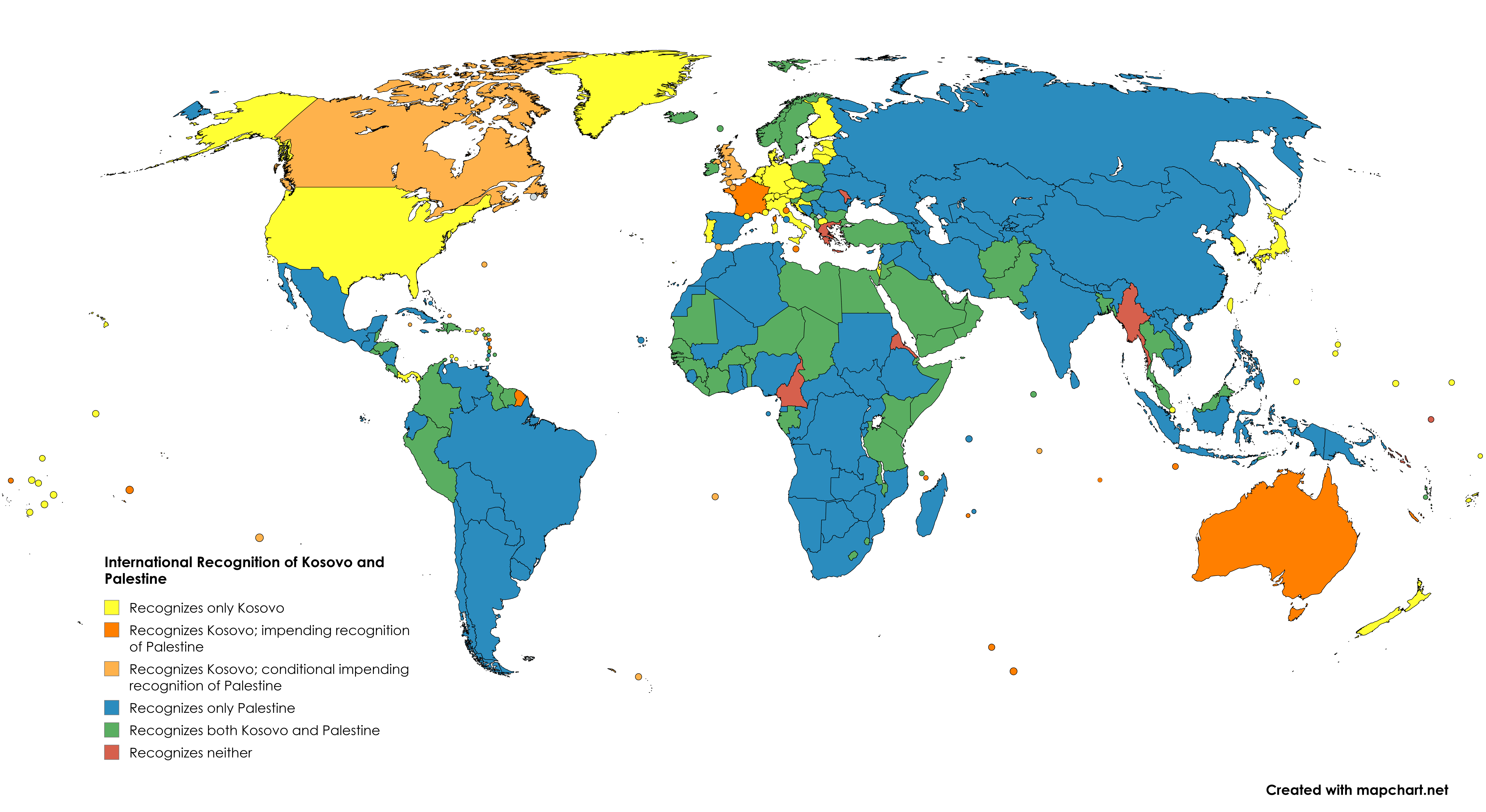Comparative International Recognition Map of Kosovo and Palestine


Alex Cartwright
Senior Cartographer & GIS Specialist
Alex Cartwright is a renowned cartographer and geographic information systems specialist with over 15 years of experience in spatial analysis and data...
Geographic Analysis
What This Map Shows\nThis map provides a visual representation of the international recognition of Kosovo and Palestine, two regions that have sought sovereignty and statehood amidst complex geopolitical landscapes. The map highlights which countries recognize Kosovo as an independent state and which countries have recognized Palestine, allowing for a comparative analysis of their respective international statuses. This updated visualization corrects previous inaccuracies and reflects the latest developments in international relations, particularly as several nations are poised to consider recognizing Palestine during the upcoming UN General Assembly session in September.
Deep Dive into International Recognition\nInternational recognition is a crucial aspect of statehood, as it often determines a region's ability to function within the global community. Kosovo declared independence from Serbia in 2008 and has since been recognized by over 100 countries, including a majority of EU member states and the United States. However, significant powers like Russia and China have not recognized Kosovo, citing concerns over the precedent it sets for separatist movements globally.
Interestingly, Kosovo's path to recognition has been marked by diplomatic efforts, including negotiations with Serbia and outreach to other nations. The map visually illustrates this complex web of recognition, showing that while Kosovo enjoys considerable support, its sovereignty is still contested in key international arenas.
On the other hand, Palestine's quest for recognition is framed within a long history of conflict and negotiation with Israel. The Palestine Liberation Organization (PLO) declared an independent State of Palestine in 1988, and since then, over 130 countries have recognized it. Notably, Palestine was granted non-member observer state status by the United Nations in 2012, a significant step in its pursuit of full statehood.
However, Palestine's recognition is uneven, often influenced by diplomatic relations with Israel and the United States. Countries in the Global South, particularly in Africa and Latin America, tend to support Palestine's claim to statehood, while many Western nations remain hesitant or conditional in their recognition. This disparity is evident on the map, which depicts a stark contrast in the geographical spread of recognition for both entities.
Regional Analysis\nExamining the map closely, we can observe distinct regional patterns in the recognition of Kosovo and Palestine. In Europe, Kosovo's recognition is relatively strong among EU countries, despite opposition from Serbia and its allies. Countries like Albania and Croatia have been staunch supporters, while nations such as Spain and Greece remain non-recognizers due to their internal territorial disputes.
In contrast, Palestine's recognition in Europe is more fragmented. While countries like Sweden and Ireland have recognized Palestine, others, particularly those with historical ties to Israel, maintain a more cautious stance. This division reflects broader geopolitical alignments and the ongoing Israeli-Palestinian conflict.
Moving to the Americas, Kosovo has seen limited recognition, primarily from the United States and a few other allies. Interestingly, many Latin American countries have recognized Palestine, often as a gesture of solidarity with anti-colonial movements. The juxtaposition of these alignments underscores how geopolitical interests shape the recognition of statehood.
In Asia and Africa, the recognition patterns diverge further. Many African nations recognize Palestine, viewing it as part of the broader struggle against imperialism. Conversely, Kosovo's recognition in these regions is minimal, as several countries prioritize their diplomatic ties with Serbia or adhere to non-alignment policies.
Significance and Impact\nThe implications of these recognition patterns extend beyond mere diplomatic niceties; they carry significant ramifications for international relations and regional stability. The recognition of Kosovo and Palestine reflects broader geopolitical currents, including the influence of major powers and regional alliances.
As countries consider their stances, particularly in light of the upcoming UN General Assembly session, the potential for shifts in recognition could alter the dynamics of international diplomacy. For Kosovo, gaining further recognition could solidify its position in Europe, while increased recognition for Palestine might reinvigorate peace efforts in the Middle East.
What’s fascinating is that these recognition trends are not static; they evolve as global politics shift. Monitoring these changes is essential for understanding the future of statehood claims and the international order. As nations reassess their positions, we may witness a reconfiguration of alliances and recognition that could redefine the geopolitical landscape in the years to come.
Visualization Details
- Published
- August 11, 2025
- Views
- 234
Comments
Loading comments...